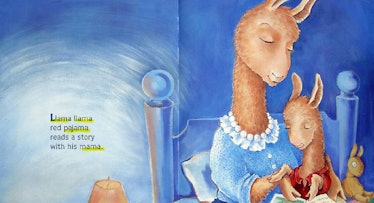‘Llama Llama Red Pajama’ is a Great Military Speech
In 2005, Anne Dewdney published an unexpected smash hit. How did she do it? By borrowing from Churchill.

One need only listen to Ludacris, that great interpreter of American children’s literature, freestyle the words of Anne Dewdney’s classic Llama Llama Red Pajama to understand why the book is, has been, and always will be a best-seller. Since it was published in 2005, the book has become an unlikely cultural touchpoint. Not only is it a rap anthem, it’s a show on Netflix. And 12 million copies of the tale of Camelid drowsiness have been sold.
On the surface, there’s not much to the story at all. A young llama yearns for his mama to come into his bedroom. But Mama has shit to do like dishes and also talking to bae on the phone. The young llama’s pleadings cross over to screaming, Mama Llama shows up salty as hell, castigates her son, but then reassures him that she loves him — but he seriously has to STFU and go to sleep.
The illustrations, also by Anne Dewdney, who died in 2016 at age 50 from cancer, are serviceable but not outstanding. She captures the wide-eyed panic of Baby Llama and the pissed-off yet-tender maternal eye-narrowing of Mama Llama. But there are many books with better art and many books with better stories. There are, however, very few books with better words. Dewdney’s word choice is percussive. The text of the book is mantra-like and repetitious, but never annoying. The title phrase — Llama Llama Red Pajama — is repeated no less than eleven times in the book’s text. But it works — at least in part because the core word, llama, is very fun to say. Take, for example, the opening quatrains:
Llama Llama
red pajama
reads a story
with his mama.
Mama kisses
baby’s hair
Mama Llama
goes downstairs.
The word “llama” is repeated three times in eight lines. That’s a lot. The word “mama” is repeated three times in eight lines. That’s a lot as well. In fact, the book features the word Mama no less than 24 times. That’s some Freudian stuff right there. And it’s also true to life.. Mama is arguably the most critical word used by children. It is a word that is uttered with ardor at night. It banishes fear.
What is most striking about Dewdney’s text is how timeless it is. And this can be traced not just to the evergreen nature of a child’s love for his mother, but also to the deliberate repetition of the start of each sentence, a very, very old-school poetic device called anaphora. Readers might recognize anaphora from Biblical psalms and just about every rousing speech ever given. “We shall not flag or fail. We shall go on to the end. We shall fight in France, we shall fight on the seas and oceans…” Winston Churchill famously told England. “Go back to Mississippi, go back to Alabama, go back to South Carolina, go back to Georgia, go back to Louisiana, go back to the slums and ghettos of our northern cities, knowing that somehow this situation can and will be changed,” Martin Luther King Jr. exhorted America.
And even when she’s not repeating herself, Dewdney uses words shrewdly. Her verses follow an AABA rhyme scheme in which Dewdney repeats not only the first two lines, anaphoristically, but the last as well. She alternates exclusively between the words mama and pajama, changing the rhyme only for the third, or B, line. Think you’ve heard that technique before? You likely have. You’ll find it in the words of Brutus in Shakespeare’s Julius Caesar: “Who is here so base that would be a bondman? If any, speak; for him have I offended. Who is here so rude that would not be a Roman? If any, speak; for him have I offended.”
It remains popular in political speeches from Malcolm X speaking the truth to Al Gore’s noble if fatal concession in 2000, “And while there will be time enough to debate our continuing differences, now is the time to recognize that that which unites us is greater than that which divides us.” And, perhaps most stirringly, in that you’ve never forgotten from A Few Good Men: “You don’t want the truth because deep down in places you don’t talk about at parties, you want me on that wall — you need me on that wall.”
But the dustbin of history is littered with forgotten speeches which might have displayed rhetorical mastery but had no heart. It is not the fate of Llama Llama. Her book pairs rhetorical stickiness with the primal urge for comfort. Her textis a cri de cœur, a rallying cry for those who are about to sleep and need just one last hug. It is an exhortation towards love. And, for parents, what greater banner could there be under which to array? None. We’ll ride unto the breach on the backs of llamas.